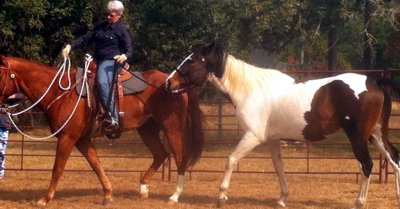Herbs: Food or Medicine?
Herbs are included in many supplements for horses so it is important to understand what actions they may have. For instance, most horse owners understand why glucosamine or MSM would be included in a supplement but what about milk thistle, slippery elm, or uvi ursi?
According to medical definition, a medicine is anything that enters the body and alters its structure or function. Using that definition, all herbs could be considered medicines. In fact many herbs are both foods and medicines. In the United States, the Food and Drug Administration (FDA) classifies herbs as foods when no claims are made that the herb will cure, treat, mitigate, or prevent any disease. If a company makes health claims about an herb then that herb would automatically have to be regulated. Most herbs are therefore sold as foods but used as medicines.
Herbs, however, act very different in the body than conventional medicines or drugs. Most drug classifications begin with the prefix “anti.” We have antibiotics, anti-inflammatories, and anti-toxins. The prefix “anti” means that these drugs act against a negative substance or process in the body.
Herbs, on the other hand, tend to increase good substances and support healthy processes in the body. In herbal therapy, the practitioner views disease as a general imbalance in the body. In the case of a kidney infection, instead of immediately reaching for antibiotics, an herbalist might give herbs that would prevent toxins from being absorbed from the bowel. These herbs would also tonify and build the kidney as well as increase the discharge of toxins through the urinary track and other eliminative organs.
The Categories of Herbs
Herbs are generally divided into three main categories: nutrient, medicinal-nutrient, and medicinal. Herbs in the nutrient category are not considered to act in on any specific condition but they do support health through their nutritional makeup by providing vitamins, minerals, protein, carbohydrates, and fat. In addition to these basic nutrients herbs also contain beneficial substances such as flavonoids. Examples of flavonoids are aromatic oils and also saponins, which are soapy substances that support intestinal health. Nutritional herbs can be used freely with no concern about toxicity.
Herbs in the medicinal/nutritional category are more targeted to address certain conditions or organ systems. They are still quite safe but would not generally be used on a continuous basis. Herbs in the medicinal category have strong action and could be toxic if used inappropriately. This month we look at an example from the nutrient category: alfalfa.
Nutrient Herb: Alfalfa
Horse owners consider alfalfa as a form of hay but it is also a bitter herb that acts on the digestive and circulatory system. It has the properties of being able to aid digestion, act as a general tonic, bring down a fever, purify the blood, and act as a diuretic. Alfalfa has been used by herbalists to treat inflammation, as in the case of arthritis. It can also aid in lowering cholesterol and sugar in the blood. The medicinal properties of alfalfa include the following definite and probably actions.
Definite Action:
- Diuretic (due to flavonoids)
Probable Actions:
- Thins the blood (due to coumarin derivatives)
- Relaxes muscle spasms (due to flavonoids)
- Lower cholesterol (due to octacosanol)
- Supports healthy intestinal bacteria (due to saponins)
- Lowers blood sugar (due to alkaloids)
Because alfalfa is high in beta-carotene it can help strengthen the cells that line the stomach wall, which may help prevent ulcers.
You can see how alfalfa—what most of us consider a basic food—has some truly powerful properties. Next month we will look at herbs that are actually considered medicinal/nutritional and strictly medicinal.
About the Author
Madalyn Ward, DVM, owns Bear Creek Veterinary Clinic in Austin, Texas. She is certified in Veterinary Homeopathy and Equine Osteopathy.
Memberships include American Veterinary Medical Association, American Association of Equine Practitioners, American Holistic Veterinary Medical Association, Texas Veterinary Medical Association and the Academy of Veterinary Homeopathy.
She has authored several books and publishes at her blog.
